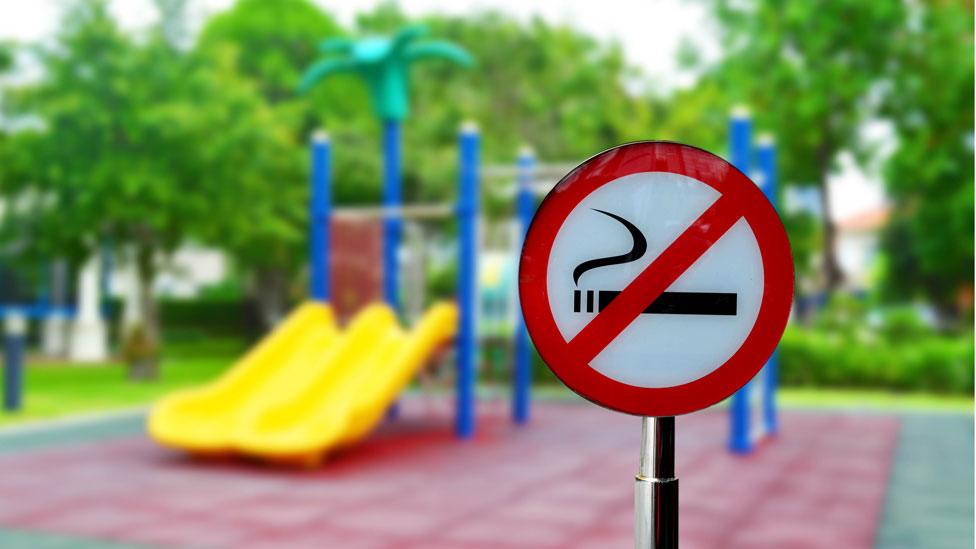Calls for tougher smoking and junk food rules in hospitals
- Published
- comments
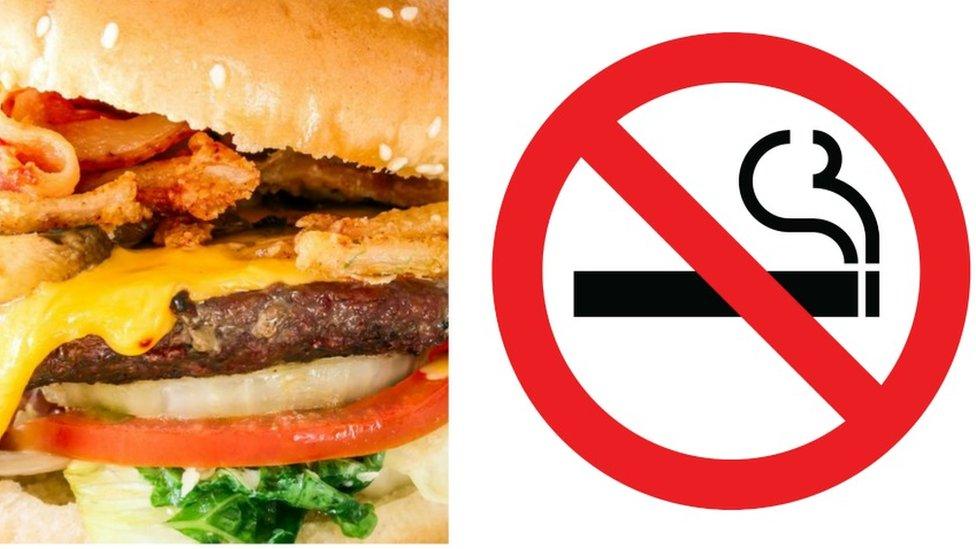
There are calls for more to be done to stop people smoking at hospitals and promote healthy living.
Health boards say they are powerless to enforce smoking bans on their grounds as they are not yet backed up by law.
BMA Cymru said a decision had to be made on whether hospitals were "places of health or not" as smoking areas could still be allowed in future.
The Welsh Government said the Public Health Wales Bill, external would help make the Welsh NHS an "exemplar" to follow.
The National Obesity Forum has also called for a blanket ban on the selling of junk food to patients, visitors and staff, saying hospitals should be "role models" for healthy living.
If introduced, the bill currently under consideration by the assembly for the second time, would make it illegal to smoke on hospital grounds in Wales.
But a clause in the draft legislation - which has faced some criticism for containing no specific measures to tackle obesity - would give hospital managers the power to create designated smoking areas if they chose.
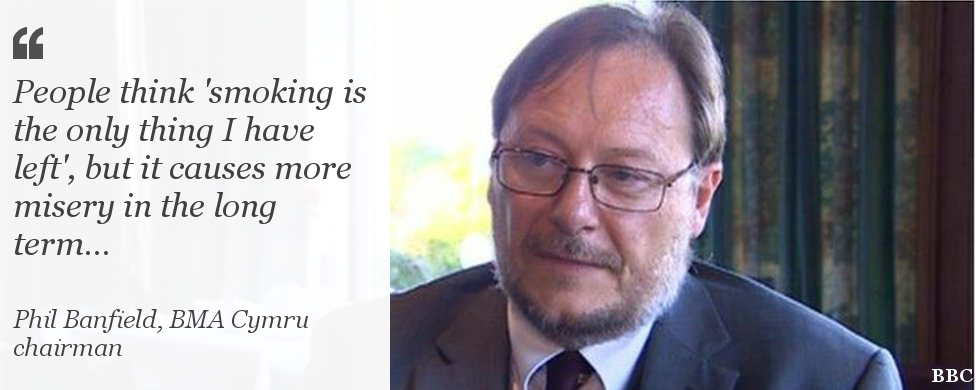
But Dr Phil Banfield said there should be no exceptions to the rule anywhere on hospital grounds, as the sites needed to promote healthy lifestyles.
"There is a conception that hospitals are places of healing," he said.
"Having an activity that is the leading cause of death and hospital admissions on the doorstep seems a contradiction."
Figures disclosed to BBC Wales News show in a six-month period security guards at Cwm Taf health board asked 783 smokers to stop smoking outside Prince Charles and Royal Glamorgan hospitals.
When asked to stop six people reacted aggressively to staff.
And 6,708 smokers outside University Hospital of Wales and University Hospital Llandough, in Cardiff, were challenged by an enforcement officer between October 2014 and May 2016.
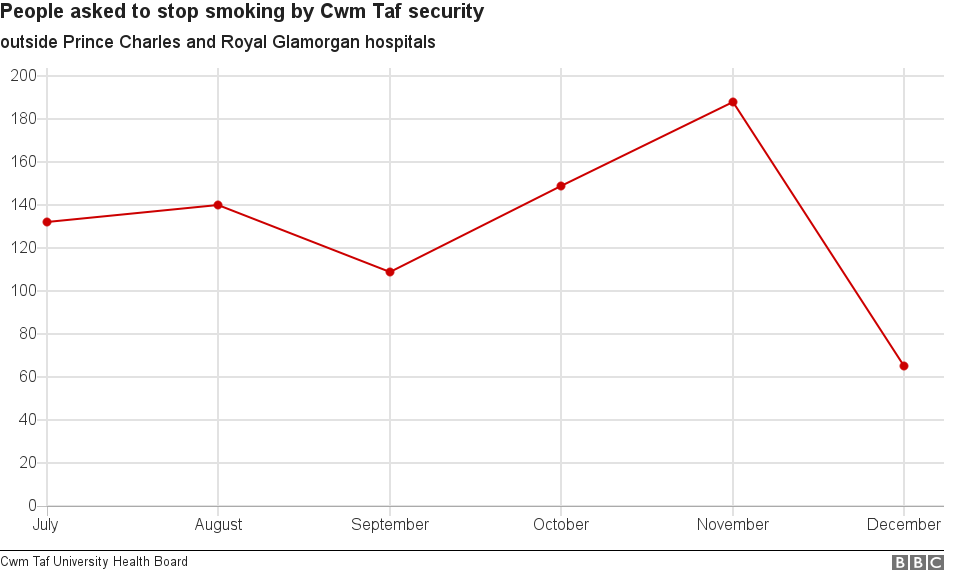
Mr Banfield said most people smoked while they are waiting in hospitals or visiting ill relatives "because they are bored" and more had to be offered as an alternative distraction at all times of the day and night.
He added that people should be offered help to quit smoking while they are in the hospital grounds - with access to support at any time, on the same footing as drug addicts.
"Hospitals need to be more inventive about how we promote the wider issues for the community," he said.
"We are very rigid in the way we run our hospitals, really we have to think about them as community assets - our hospitals belong to the people."
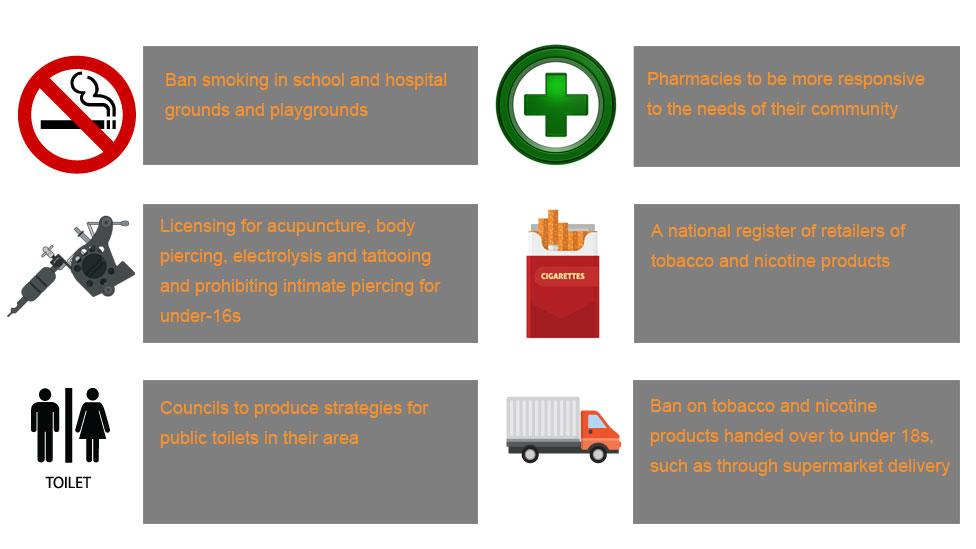
Public Health Wales Bill measures on the table
But smokers' group Forest said a blanket ban on smoking anywhere on hospital grounds was unfair and called for smoking shelters.
Director of the group Simon Clark said: "It's not just petty, it's inhumane to ban smoking everywhere on hospital grounds.
"It doesn't matter whether you're a patient, a visitor or even a member of staff; Hospitals can be stressful places.
"Smoking is a comfort to many people.
"To tell anyone, especially elderly, infirm or long-term patients, that they can't smoke anywhere on the grounds is an abuse of power.
"Designated smoking shelters are the very least smokers deserve, but what's more important is that politicians and hospital administrators demonstrate some common sense and compassion."
Since 2008 health boards have been barred from stocking vending machines with unhealthy snacks - such as crisps and fizzy drinks - following Welsh Government guidance., external
Despite the rules stressing only food with "positive nutritional benefit" should be sold, some health boards appear to be ignoring the advice.
Cwm Taf health board said all six of its hospitals had vending machines containing canned drinks and sweets, while Abertawe Bro Morgannwg hospitals have 34 machines selling fizzy drinks, according to a Freedom of Information (FOI) request by the Welsh Conservatives.
The BMA has previously called for hospital food standards to be made law rather than guidance as part of the Public Health Wales Bill, but has warned some areas to tackling the problem are outside the assembly's control.
Health boards 'powerless' to stop smoking outside hospitals
Tam Fry, of the National Obesity Forum, said: "A hospital is a place people go to be cured, if we therefore do not have healthy food and behaviours in the hospital for the patients, visitors and staff, then we are selling short of what is required.
"You have barely walked through the door and there are places selling and promoting sugary food and drink, it is soul destroying for the people that work there, who are trying to free people from disease.
"The people that are buying this stuff are probably going to be treated by them, if not now, then in the future."
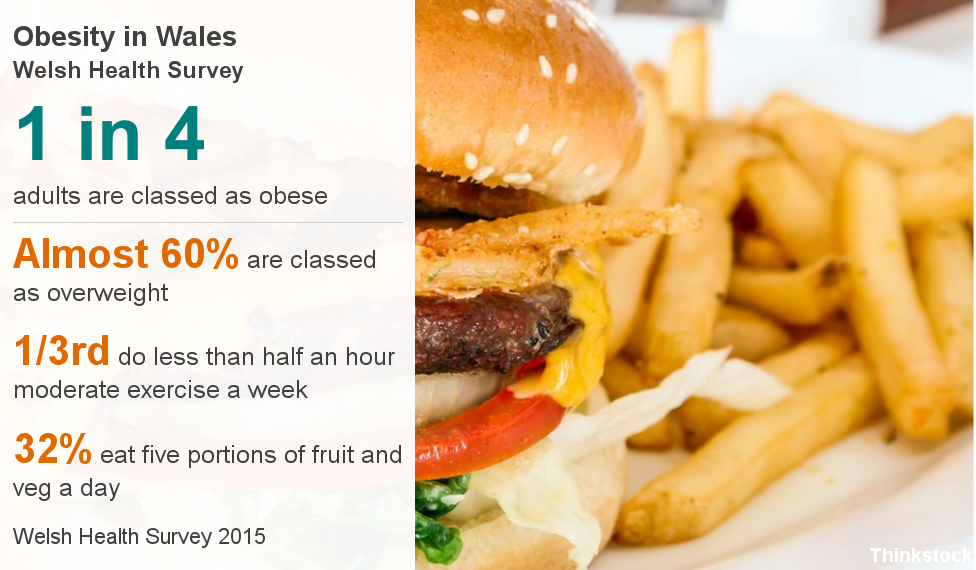
Mr Fry said that guidelines were being ignored - with concessions like coffee chains opening in hospitals and canteens serving fast food - as health boards were bending to people's taste for unhealthy snacks.
"If they want to buy a burger outside the hospital and bring it in there is nothing you can do about that, but it is doing the patients no favours if they are selling junk food," he said.
Director of the Welsh NHS Confederation, Vanessa Young said: "Maintaining food standards, particularly in places such as hospitals, can inform and influence people's perception of what foods are considered acceptable and healthy.
"While catering standards are already in place to make sure patients receive adequate nutrition to assist with their recovery in hospital, we know more work is needed to make sure that healthy and balanced meals and food are offered to all those accessing the restaurants, including staff, patients and visitors."
The Welsh Government said it had already introduced initiatives to encourage healthy eating and were working with stakeholders to considering ways to improve healthy food provision in hospitals.
A spokeswoman said that the new health bill would build on voluntary smoking bans and new hospitals were being focused on the "patient environment and journey" with courtyards and breakout spaces.
"We want people to be able to access health services in a modern, fit for purpose environment.
"Many of our hospital buildings have access to coffee shops and other facilities run by a range of organisations which provide access for visitors and patients."
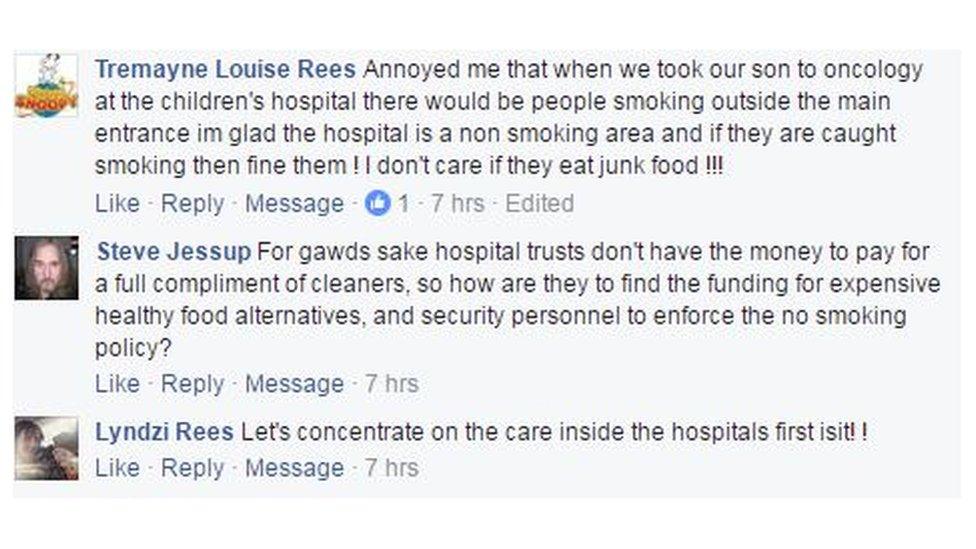
Views varied on facebook
- Published1 February 2017
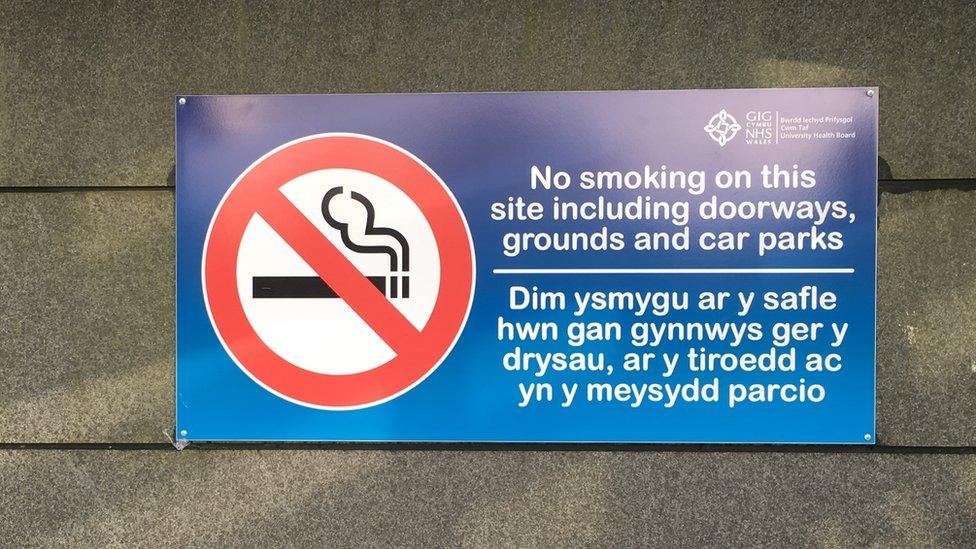
- Published15 December 2016
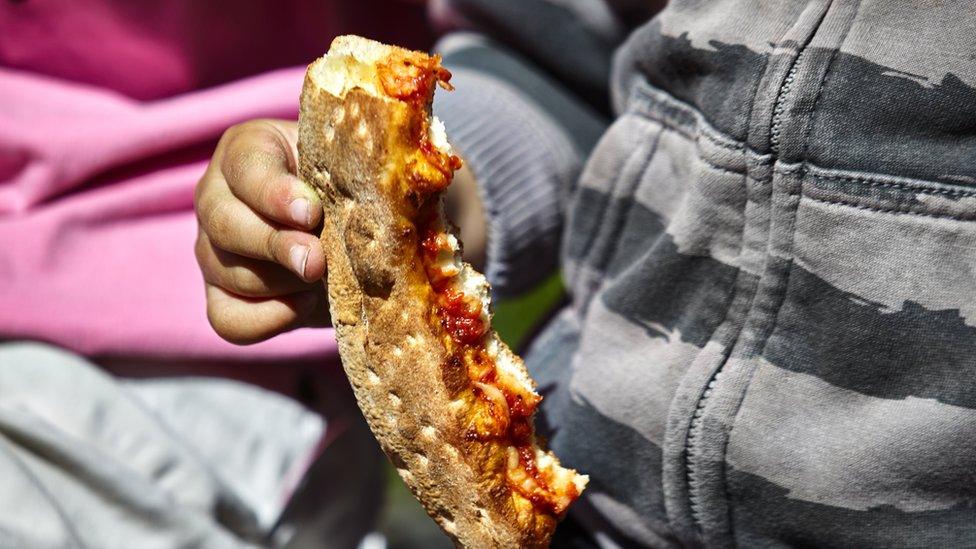
- Published13 May 2016

- Published2 November 2016
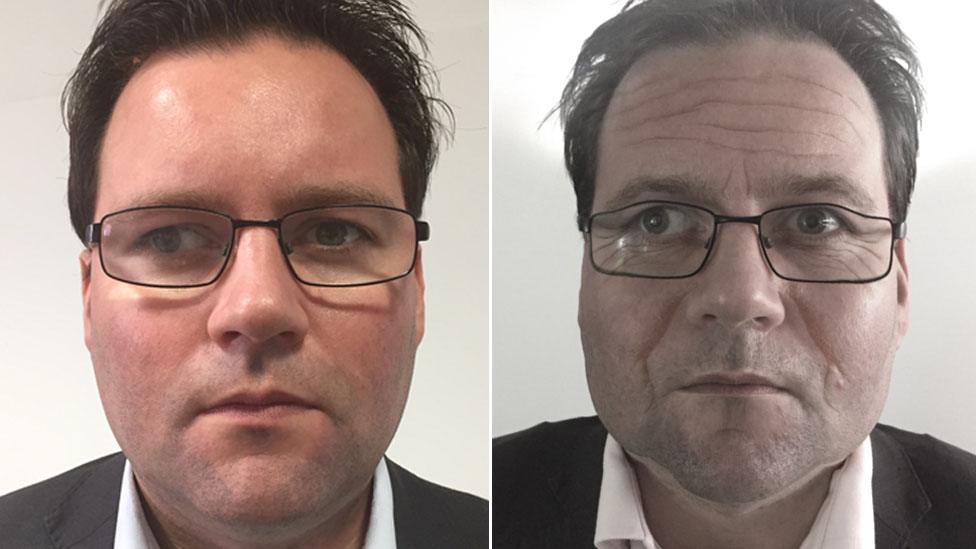
- Published19 December 2013

- Published7 November 2016
